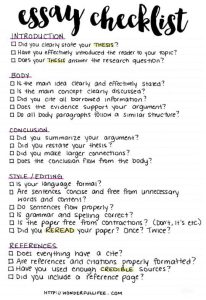Chapter 15: Editing and Revising Strategies
what should you be looking for when you edit and revise?
Many people think that professors want their writing to be long and full of complex language, but that actually couldn’t be further from the truth! At this level, we look for what I like to call the Six C’s of good writing:
1. Clarity: can we understand what you’re trying to say or argue?
2. Concision: is your writing “tight”? Are you adding in needless sentences, words, or thoughts?
3. Cohesion: does your essay flow? Do the paragraphs transition well? Is everything in the paper related, or are there tangents and parts that don’t make sense?
4. Confidence: is your tone assertive (but not rude or aggressive)? Do you use enough evidence without relying on other people’s ideas too much?
5. Cleanliness: is your paper full of spelling or grammatical errors? Do you have information or pieces missing? Do you have clear paragraphs? Is your formatting correct? Is the paper a jumbled mess?
6. Compliance: have you followed the instructions? Have you included and done everything asked of you? Have you met the word/page requirement?
Paying attention to the Six C’s can make a huge difference in the final grade that you earn on your paper. Make sure that you leave enough time to go over all of these elements before you submit.
Video source: https://youtu.be/vin0EzcUqJk
editing and revising strategies
Video source: https://youtu.be/T5OMs3U3NOM
Video source: https://youtu.be/QUvXFEV17sk
editing & proofreading tools & Tips
There are some tricks and tools that many of your professors will have used when they were in school, and they can be helpful for you now:
1. A Text-to-Speech Reader: running your paper through a text-to-speech reader can help you to hear the essay better. Our brains tend to trick us by seeing what we think should be on the page, so when your paper is read back to you, it’s easier to catch the mistakes.
2. An Editing/Revising Checklist: this can be as simple as a list in a Word document that you go over before you submit assignments, or it can be a detailed rubric that you lay out for yourself.

3. Have someone unfamiliar with the topic/class read over your paper: this technique works because if a lay-person can’t understand the paper, then you haven’t explained yourself clearly enough. Remember: your professor may be reading about this topic for the first time, so it’s important that a general audience can understand you.
4. Take a break: when you let your paper sit for a few days and come back to it, your brain has a chance to reset and you can look at the paper with fresh eyes and perspective.
5. Keep a separate Word document for your brilliant, but unrelated, ideas: many students have a hard time ‘letting go’ of pieces of their essay because it’s easy to get emotionally attached to ideas (professors struggle with this as well!). Keeping a ‘notes’ or ‘ideas’ file going where you can dump writing that isn’t working in this context can be helpful. You know that it’s not gone, but it’s not interfering with the flow of your graded assignment.
6. Use an editing program, like Grammarly: programs like Grammarly can help with the editing portion because it will flag things like grammar, spelling, and clarity issues.

